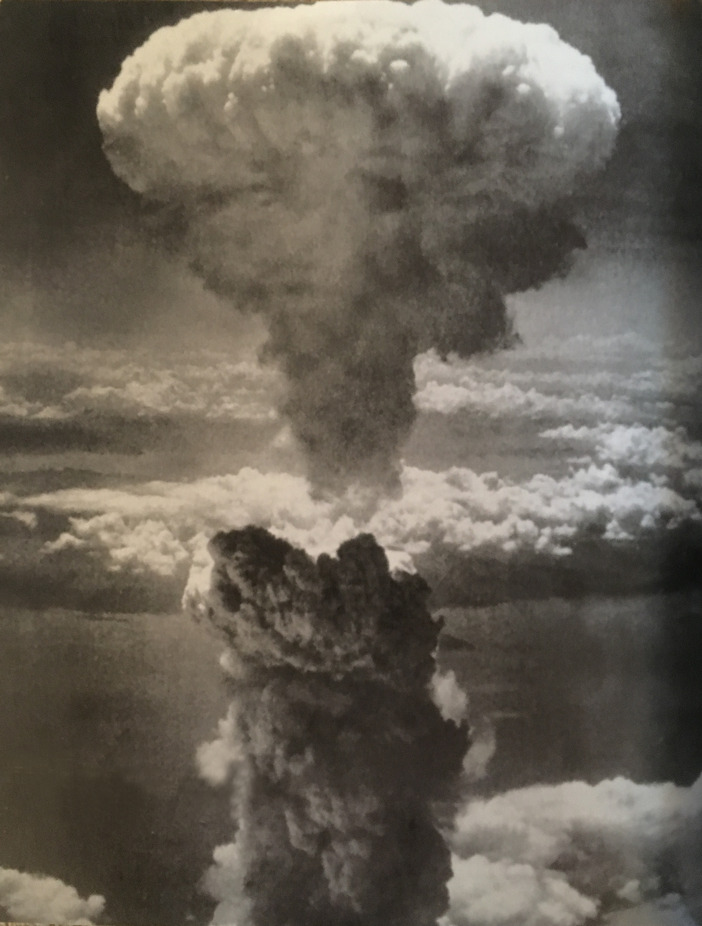On December 11, 2005, a nuclear device was detonated in Manhattan next to Madison Square Garden, on the corner of 32nd Street and 7th Avenue.
The nuke was small. It was tailor-made to fit into a large Samsonite suitcase. The blast was only half the magnitude of the bomb that hit Hiroshima sixty years before. But it was powerful enough to topple the Empire State Building and most of midtown’s other skyscrapers.
In rapid succession, similar blasts rocked Chicago, Houston, Los Angeles, Seattle and Washington, D.C. The Los Angeles bomb, stationed on a ship floating offshore, was much more powerful than the others. Unfortunately, the wind was blowing East that day.
Seven million people, including most of the nation’s political leadership, died within the first 24 hours. Many more were less fortunate, dying slowly over the next few months from massive burns and radiation exposure as their skin peeled and their hair fell out. Others survived in the short run, only to ponder their deteriorating health and to give birth to deformed babies.
The stricken cities were rendered useless and uninhabitable, the remains of charred office buildings serving as dark monuments to a Golden Age that once was.
The Fallout
America’s immediate response in the global arena was to seek retaliation. When in doubt, bomb Saddam. However, Saddam was long gone, overthrown and executed by a Shiite movement funded from Tehran, so it was not clear whom to bomb now.
A few intercepted phone calls suggested that the Los Angeles ship used to be owned by someone named Costas Papandreou. The trail of Costas led to an Indonesian shipping company, but then went cold. Several Tomahawk missile strikes were ordered against Indonesian fishing villages suspected of harboring the disciples of Osama bin Laden. That did not produce any benefits, aside from vaporizing a few fishermen. But the footage of fiery missile launches was a soothing sight on TV, assuring the grieving American public that something was being done and somebody’s ass was being kicked.
Soon, the military campaign revealed a more fundamental flaw. As the supply of Tomahawks began to dwindle, it became apparent that there was no more money for building new ones. The American economy, the engine of Western global hegemony during the last century, was in ruins.
The nuclear strikes had shattered the business world and the consumer demand that kept feeding it. Gone were the investment bankers, lawyers, sex therapists, public relations gurus and accountants who once populated the ruined skyscrapers. Gone were the hotels, restaurants and nightclubs that catered to them. Gone were the limo drivers who whisked them away to airports and the trophy wives who spent their bonuses on mink coats. Gone was the tax revenue they all generated for Uncle Sam.
Unable to pay its bills, America defaulted on Treasury bonds. The stock market tanked. The dollar plummeted on foreign exchange markets. Unemployment jumped to double digits.
This, in turn, spelled doom for any investor outside America who had been betting on America’s long-term stability. Most severely affected were those whose economic ties with America were the most profound: Canada, Mexico, the European Union and Japan. The impact was not as painful for less developed or more isolated nations such as India and Russia, whose trade with America was relatively insignificant and whose citizens held few American investments. Sometimes it pays to be an outsider.
The rich countries also had to cope with a new phenomenon: the flood of American refugees. Millions of people, deprived of their homes and jobs and fearing further attacks, left the devastated land forever. Most settled in Europe; large expatriate communities also sprang up in Australia and Latin America. They were not always welcome in their new homelands. The older emigrants were often unable to let go of the past, refusing to learn the local languages and stubbornly believing that their ways were superior to those of the locals. The younger ones assimilated more quickly.
One particular group of expatriates gave Americans a bad name. Former members of the armed services, still wielding potent weapons and know-how but left without an employer or a supplier of new munitions, were frequently tempted with lucrative offers. These offers came not only from the Europeans and the Japanese (who ultimately bought most of America’s nuclear arsenal and military-industrial complex), but also dubious characters ranging from Sheikh Abdulaziz of Kuwait (who purchased the aircraft carrier John F. Kennedy and hired most of its crew) to General Taveras of Colombia, who used his cocaine revenues to buy forty Apache helicopters, a squadron of aging B-52’s and a large supply of “daisy cutter” bombs. He promptly unleashed these goodies on several rebellious provinces.
Most former American soldiers refused to work under new flags. They showed an astonishing degree of loyalty, like Brooklynites who still root for the Dodgers. But there are always a few bad apples. The aforementioned General Taveras also secured the services of Col. Patrick O’Brien, a former U.S. Army Ranger who brought along an experienced crew of several hundred men and a substantial cache of weapons. O’Brien, who took a fancy to calling himself “Papi,” was essential in helping Taveras consolidate his shaky hold on power. Heavily influenced by Apocalypse Now, Papi set up shop in the jungle where he tortured and decapitated captured guerilla fighters. Eventually, O’Brien and his armored convoy of cronies were ambushed in Cali and gunned down after a six-hour firefight that spanned dozens of city blocks and wiped out an entire neighborhood.
The most notorious American mercenary was Lt. Col. Leroy “Fat Dog” Henderson. An experienced F-15 pilot, he rented himself out to Liberian rebels and single-handedly wiped out the government’s air force (which, concededly, only consisted of eleven warplanes). Left with few challenges and lots of spare time in the sky of Monrovia, Fat Dog turned to strafing hordes of civilians who were fleeing the ravaged capital. The death toll from his marksmanship reached 6,000 people.
The New World
America could no longer police the world. The Europeans, armed to the teeth, closed their borders to all immigrants except the Americans and hunkered down. The rest of the globe was left up for grabs.
Israel struck immediately, deporting a million Palestinians from the West Bank while killing another half million in the process. The Israelis established a ten-mile-deep no man’s land around the border, rife with landmines and heat-seeking sniper robots which gunned down anything that moved. It was an expensive investment, but it ended the intifada. The Muslim nations tried to mount a coordinated counter-attack, but were quickly decapitated with preemptive Israeli nuclear blows to Baghdad, Damascus, Tehran and Riyadh. The world protested and Larry King wept live on CNN, but in the end everyone in the West was happy that the damn thing finally got resolved, although too ashamed to admit it.
China followed suit, unleashing its pent-up fury on Taiwan with a massive barrage of cheap missiles and, once air superiority was won, cheap glider planes packed with cheap soldiers. Next, the Spratlys and the entire Korean peninsula were annexed without a fight. Vietnam escaped a similar fate by forging an alliance with nuclear-armed Japan and the Philippines.
Russia’s Putin, seeing the handwriting on the wall and still in search of a warm-water port, sold Siberia to China in exchange for Chinese approval of Russian recolonization of Central Asia and invasion of Iran and Iraq, devastated by civil wars and the Israeli nuclear attack. The West did not object as long as BP/Amoco and Exxon shared the oil and gas booty with Lukoil. After all, it was nice to have somebody in charge in the Gulf, and nobody except the Russians was up for the job. Guerilla warfare waged by Osama’s followers sent many Russian boys home in zinc coffins. But what else is new? Some people never learn. Lukoil, however, benefited by becoming the top oil company in the world. The stock soared even further after its CEO honestly explained: “We don’t need to cook the books or shred documents to make the stock go up. The stock goes up because there is no antitrust law in Russia.”
An overpopulated India, inspired by the Israeli example and undeterred by potential human losses, fired a “preemptive” salvo against Pakistani missile silos and air force bases. A couple of Pakistani nukes survived and were later detonated around Hyderabad in a clumsy effort to wipe out the advancing Indian armies. The self-immolation defense did not pay off. Despite tremendous casualties, the Indians doggedly pressed on until Pakistan ceased to exist as a nation-state. 200 million died in the bloodiest war in history. The only thing one needs to know to imagine the horror is this: millions of Pakistanis fled to Afghanistan. When seeking refuge in Afghanistan is an improvement, your life obviously sucks big time.
Some landscape changes were more positive. Africa, devastated by famines and AIDS, was united under the leadership of Nigeria’s General Ede. In his Garibaldi-like conquest march, Ede was aided by ex-GI mercenaries. Ede expelled foreign corporations, established a common market and introduced a single currency and a federal African legal code. Although he was ultimately deposed and spent his final years in exile on Madagascar, it is undisputed that Ede’s policies pulled Africa from the brink of the abyss.
Mexico went through a roller-coaster ride. Its economy was hit hard by America’s collapse, but was later boosted by the flood of educated, and sometimes still wealthy, refugees from America. Seeking to imitate the American model (minus the imperial ambitions) and to benefit from an upgraded labor force, President Garcia turned to the twin pillars of education and research & development as new beacons of hope. The discovery of new drugs such as torozone, a substance derived from a rare strand of spicy habañero peppers grown around Chihuahua, fueled the Mexican recovery. Torozone cured AIDS and cancer with a success rate of over 80%. The Mexican economy boomed, with pharmaceutical companies displacing cocaine cartels as the most lucrative employers. As the Gipper would have said, Mexico became the new shining city on a hill.
On November 3, 2031, both California and Texas voted to secede from the United States and to join Mexico by solid margins. This time, there was no Lincoln to stop them. In a bow to the new entrants, Mexico was renamed as the United States of Mexico: U.S.M.
The New America
Those who stayed behind tasted the bitter decline of a superpower all too familiar to the Brits, the Russians, and the Germans. In the end, the salvaged remnants of America’s glory were still good enough to patch together a decent place where folks were scraping by, making a less glamorous living than before.
Radiation-related sicknesses were common, and poorly treated. The lack of national health care proved to be the soft underbelly of the American system. Many survivors of December 11 died from lack of adequate medical attention.
The Baby Boomers were left with a devastated investment portfolio and without Social Security. Millions starved. Catering to a radicalized young electorate, a Senate candidate from Oregon named Johnny “Straight Talk” Bailey lauded the rising mortality rate among senior citizens as “the Darwinian vacuum cleaner” that brought justice to “the selfish generation.” Fortunately, Bailey was shot dead at a campaign stop by an 84-year old grandmother before his career could advance any further. (The polls had him winning by a twenty-point margin.)
Another popular movement, the Comeback Kids, was comprised of military veterans who advocated a policy of rearmament and assault on Mexico, which they blamed for stealing American brains and money. The Comeback Kids vowed to wage a guerilla warfare against “Mexican occupation” before the secession referenda took place in California and Texas. The movement flamed out after its leaders profited handsomely from investing in the Mexican stock market and retired to newly-purchased villas in Cancun. (President Garcia denied giving them any insider tips.)
With agricultural subsidies eliminated and large swaths of farmland poisoned forever, America became an importer of food. Military hardware alone could not pay the bill. The aging oil fields and coal mines reopened, with millions of desperate workers slaving away for a pittance. Cartels and robber barons resurfaced, unimpeded by the weakening federal government.
Serious journalists were shot or emigrated. The news shows were completely eliminated, since the news was too sad to watch and nobody cared anyway. They were replaced with more game shows and the top-ranked “Old But Not Cold,” a live pornography show starring fortysomething former sports legends. Most nights the action was strictly heterosexual fare, but Gay Night (on Thursdays) surprisingly drew the highest ratings. Who would have known?
Salvation arrived in the pudgy form of Ricky Penacchia, a former radio talk show host with a shady past involving Atlantic City gambling establishments and a family sanitation business on Staten Island. Despite a heavy Brooklyn accent and a violent temper (publicly displayed when he punched out a TV camerawoman), Penacchia managed to rally the masses around him. In fact, his approval ratings jumped ten points after his deft right hook to the nosy reporter’s chin was nationally televised.
Penacchia had little knowledge of geography or literature, but was no dummy. He retained a fond memory of a spring break spent in London’s pubs, and was also keenly aware of America’s deteriorating condition. Immediately upon being elected President in 2032, he paid a visit to the United Kingdom and charmed the British crowds with his defiant exuberance. By that time, the Brits were completely fed up with the encroaching federalism of the European Union and were ready to split off on their own. Penacchia quickly found common ground with Prime Minister Castleberry and cut a deal.
On July 4, 2033, the prodigal sons came home to a warm welcome. America voted overwhelmingly to join a reconstituted British Empire. Penacchia kept the title of Governor. But until his final days he preferred his original nickname, earned on the mean streets of Bensonhurst: The Boss.
By Vadim Mahmoudov
April 2002




